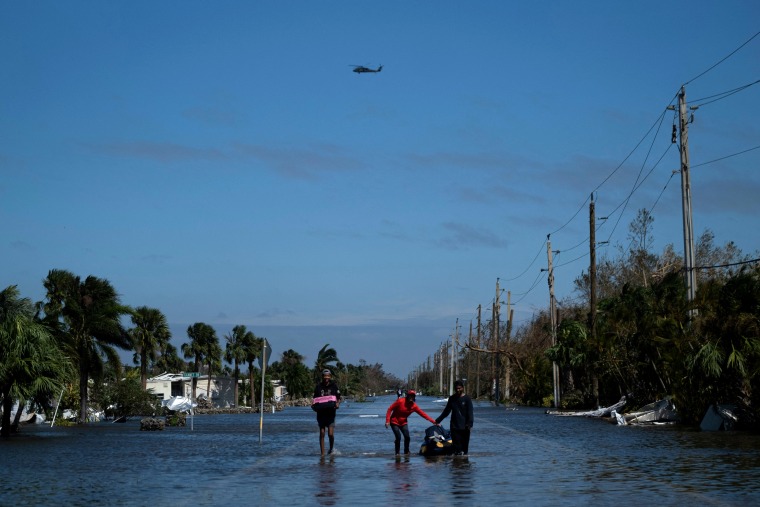After Hurricane Ian’s destructiveness exposed Republicans’ hypocrisy about the importance of the federal response to disasters, they quickly bounced back with the lie that Vice President Kamala Harris and the Biden administration plan to settle some racial scores by denying white people hurricane relief dollars. While outrage at Harris’ use of the word “equity” was being manufactured before the narcissist formerly known as Kanye debuted his “White Lives Matter” shirts, those complaining about the vice president’s remark are making the same politically devious argument.
Sen. Rick Scott, R-Fla., tweeted that Harris was “trying to use race to divide us.”
Referring to the vice president’s marriage to Doug Emhoff, Rep. Marjorie Taylor Greene, R-Ga., tweeted, “Is your husband’s life worth less bc he’s white?” Sen. Rick Scott, R-Fla., tweeted that Harris was "trying to use race to divide us," and Florida’s Republican governor, Ron DeSantis, who actually has been using the politics of division for his advantage, told Fox News’ Sean Hannity: “I think she's trying to play identity politics with a storm and a natural disaster. And I think it's ridiculous.”
DeSantis said Deanne Criswell, the administrator of the Federal Emergency Management Agency, “threw cold water” on Harris’ emphasis on equity when she said FEMA will “support everybody” who needs help after Ian. But only the intellectually dishonest would interpret Criswell’s promise of help for everybody as being in conflict with the vice president’s remarks. And only those who are OK with the way recovery programs favor those who already have a leg up would object to a government official’s calling for a more equitable response.
Harris used the word “equity” at Friday’s Democratic National Committee Women's Leadership Forum in Washington in a long and thoughtful response to a long and multi-pronged question from moderator Priyanka Chopra Jonas about hurricane recovery, climate legislation and the world’s poorest countries’ disproportionately suffering from the richest countries’ emissions.
“I’m gonna unpack that question,” Harris said at the start of a nearly five-minute response. The vice president accurately stated that “our lowest-income communities and our communities of color … are most impacted by these extreme conditions,” and then she made the ethically correct argument that “we have to address this in a way that is about giving resources based on equity, understanding that we fight for equality, but we also need to fight for equity, understanding not everyone starts out at the same place.”
“And if we want people to be in an equal place, sometimes we have to take into account those disparities and do that work,” she said.
Communities who have lived through hurricanes can tell you that the federal government’s mission is to help put things back the way they were — however bad they were. “In the private sector, we can see something that has been destroyed and say, ‘Let's build it back better,’” a board member of the Louisiana Recovery Authority said after Hurricane Katrina. Then, referring to the law that governs disaster recovery, he said, “Under the Stafford Act, you pretty much are relegated to building it back the way it was.”
Justin Dorazio, a research associate at the Center for American Progress who wrote a July report called “How FEMA Can Prioritize Equity in Disaster Recovery Assistance,” said in an interview Tuesday that it remains true that “a lot of the programs within FEMA, they do require things to be paid for damages that were incurred”; that is, they call for things “to be restored to as they were.”
Sociologically, that’s what Harris’ critics are demanding. They want the same socioeconomic disparities that existed before a storm to exist after it. To put it another way: They don’t want the government to use the occasion of a storm to in any way decrease the advantages the white and relatively wealthy have over their counterparts.
But what Dorazio and other researchers before him have shown is that the government’s response to storms doesn’t just leave disaster areas with the same levels of inequality they had. It increases them. Dorazio says a big problem is that the federal government focuses more on the amount of damage than on the level of need. Junia Howell, a co-author of a 2018 report called “Damages Done: The Longitudinal Impacts of Natural Hazards on Wealth Inequality in the United States,” said in a 2020 speech to the National Emergency Management Association that FEMA’s focus on restoring properties to wholeness but not people to wholeness has the effect of benefiting property owners and causing those who don’t own property to fall further behind.
That’s what Harris’ critics are demanding. They want the same socioeconomic disparities that existed before a storm to exist after it.
She said: “Much of the literature talks about inequalities in disasters. They say, well, disasters simply reveal the inequality. ... Disasters are not creating it; they’re just showing it. However, much of our research isn’t able to substantiate that.”
The 2018 study, which Howell wrote with James R. Elliott, said: “Results indicate that as local hazard damages increase, so does wealth inequality, especially along lines of race, education, and homeownership. At any given level of local damage, the more aid an area receives from the Federal Emergency Management Agency, the more this inequality grows.”
Dorazio said he had no comment on the vice president’s remarks. Asked whether any FEMA official had responded to his July report, he said, “I know that FEMA takes these issues of equity seriously, and I think that that's as much as I can say on the matter.”
It’s great if FEMA has gotten serious about responding to disasters in a way that doesn’t boost the relatively well off and ignore the neediest and gotten serious about not responding in a way that disproportionately gives help to better-off white neighborhoods. But the agency has a disappointing past it needs to overcome, one in which, regardless of what the agency has intended, “white lives matter” has been the result.

